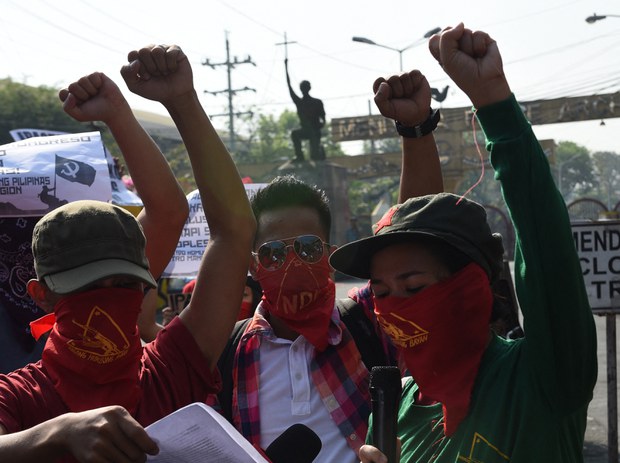Philippine senators want state employees to report relatives linked to terror groups
2022.09.01
Manila
 Members and supporters of the New People’s Army, the military wing of the Communist Party of the Philippines, raise clenched fists as they chant slogans during a protest near Malacañang Palace in Manila, March 31, 2017.
Members and supporters of the New People’s Army, the military wing of the Communist Party of the Philippines, raise clenched fists as they chant slogans during a protest near Malacañang Palace in Manila, March 31, 2017.
Philippine senators are proposing a law to compel state employees to inform authorities about relatives suspected of links with “terrorist groups,” but human right advocates and others say the potential legislation could be a dangerous type of witchhunt.
Sen. Francis Tolentino, who is supported by other senators, pitched the idea during a speech at the Senate on Tuesday. Even without a law instituting such a measure, he said, the Civil Service Commission could require civil servants or potential hirees and appointments to disclose such information.
“Is it now the right time that we also require when one enters the government through an appointment or an elective position to perhaps declare – do you have a relative within the fourth degree of consanguinity who is a member of a terrorist organization, who is an affiliate of an organization that seeks to overthrow the Republic of the Philippines,” Tolentino said, according to a recording of the hearing made public on Thursday.
The senator floated the proposal days after Adora Faye de Vera was arrested on Aug. 24 on suspicion of being a leading officer of the outlawed Communist Party of the Philippines (CPP), which has been waging a rebellion since 1969.
She is the estranged sister of Prospero de Vera, chairman of the government’s Commission on Higher Education, who said they had had no contact in more than two decades.
In February, the Philippine government officially branded 16 left-leaning groups as “terrorist” organizations, saying they were funneling money to communist insurgents. The groups were described as “underground organizations” of the outlawed CPP and its military wing, the New People’s Army (NPA).
In presenting his case for the proposed legislation, Tolentino likened it to visa applications in foreign embassies, including the United States.
“If you apply for an Australian visa and a U.S. visa, you will be asked: are you a member or affiliated with the group inclined to overthrow the government? Or are you affiliated with a terror group? Why can’t we require this for government officials,” Tolentino said.
Officials’ relatives could gain access to confidential information, the senator said, warning this could jeopardize national security.
Sen. Ronald dela Rosa, a former police chief who implemented former President Rodrigo Duterte’s controversial drug war, supports Tolentino’s idea. He said the proposal would allow security officials to limit the access of public officials with relatives linked to militant groups.
“We should limit access to our information. They might access our top secrets and these might unknowingly be used against us,” dela Rosa told reporters on Tuesday.
Minority Leader Aquilino Pimentel III, however, expressed concern about the proposal.
“We all have free will,” Pimentel said, citing the case of the Zumel brothers.
Former Brig. Gen. Jim Zumel’s brother Tony was the first chairman and a senior adviser of the National Democratic Front, the communist party’s political wing.
“If this was required then, it would have affected his career and he would have never become a general because of decisions made by his brother when he is not his brother’s keeper. What is the value of such a declaration?” Pimentel said.
Karapatan, a local human rights group, denounced the proposal, arguing it is a pretext to crack down on government employees or officials who have dissenting beliefs.
“If this proposal will be enacted, it will open the floodgates for possible violations on the right to due process, to freedom of thought or opinion, to privacy and other forms of threats to life and liberty of government workers and their families,” Cristina Palabay, Karapatan’s secretary general, told BenarNews.
Karapatan branded the proposed law as a “witch hunt.”
“Isn’t it more important to check officials and agencies who engage in influence peddling, graft and corruption for self-serving interests rather than make proposals on irrelevant issues?’ Palabay said.
She also called for a review of the Anti-Terrorism Act, which then-President Duterte signed in July 2020.
The law updated an earlier measure that the country’s security establishment criticized as “lacking teeth” in catching and prosecuting terror suspects.
Thirty-seven petitions sought to nullify provisions of the law as unconstitutional, making it one of the most challenged pieces of legislation before the Supreme Court.
The court upheld the constitutionality of most provisions including the power to designate a person or group a terrorist even before a trial.







